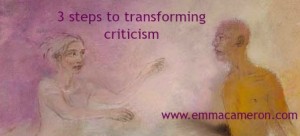What to do when your creative criticism turns sour Share on X
If you’re a creative person, you’ll be familiar with the scenario:
It’s time to take a long, hard look at something you’ve been working on.
You take a step back, scratch your chin, maybe sip some coffee, and consider the thoughts, feelings and mental images that come up.
Being able to be critical is vital for the creative person.
The trouble is, sometimes this useful ally, your critical faculty, can also be your enemy. It can sap your energy and trap you in difficult downward spirals of negativity.
An increasing stream of negative critical thoughts and feelings about your creative work can lead to deep doubts about yourself as a person. And you gradually stop feeling creative and just feel dispirited instead.
It can happen in a sneaky, subtle way that suffuses your whole way of living. It might be hard to notice at first, just like the air you breathe.
Gradually you feel more and more downhearted, perhaps anxious or maybe a bit depressed.
Creatives: feeling critical - or criticised? Here's what to do. Share on XHere’s my three-step process for transforming things when your critical faculties turn destructive.
Step 1: Notice What’s Going On
Notice when you feel critical. What are your critical thoughts? When do they appear?
Get really interested in your critical thoughts. Are they mostly directed at yourself, other people, or both?
Maybe you felt critical (of yourself) when you looked in the mirror? Maybe when you walked past the house down the road where they have those weird things in the window? Maybe when your colleague wore that skirt you think is too short? Maybe when you looked at a mark on the dish that your partner washed?
Feeling critical of others might feel harmless, but actually the effects build up inside the person who’s having the critical thoughts, not just the one who is being criticised.
Or does it feel like all the criticism is coming from outside of you, from people around you? If so, begin to become aware of the times when this happens, and start to unpick:
- Are any of these criticisms actually coming from me at first?
- Is there any way in which I am inviting the criticisms?
- Could the comments perhaps be heard in a different way, as constructive and helpful?
Step 2: Get Curious
Here are some things to wonder to yourself when you notice that you’re doing a lot of criticising, whether it’s directed at yourself or at others:
•Why do I feel like criticising?
•Could it be because I’ve endured criticism for a similar thing?
•Is there anything I secretly envy here?
•By criticising, am I protecting myself from knowing something painful about myself?
•Am I trying to make myself feel ‘up’ by putting someone else ‘down’?
•Am I continuing someone else’s dirty work by making sure I keep feeling bad about myself?
Step 3: Experiment with a Change of Attitude
See if – even if just for a few moments at a time – you can mentally and emotionally hold both yourself and the criticised person in a feeling of open-hearted loving-kindness.
Know that you and everyone else are struggling with the reality of being imperfect beings in an unpredictable and often scary world. We humans mess up, we get scared and we do the wrong things because we’re deep-down vulnerable and anxious.
And we love and want to be loved. We want to enjoy and be enjoyed.
Maybe we can live with a little less criticism and a lot more empathy, and re-set our antennae so we are quicker to pick up the joy, the care, the good intentions, the hopefulness, the kindness, the fragility, and the almost-impossibility of living.
Let me know in the comments below how it goes.
And if you’ve tried the above process, kept at it repeatedly for a while, and you still feel weighed down, dispirited, or confused, don’t worry – you are not a hopeless case!
Even a few sessions with a registered and experienced therapist might shine new light onto what’s going on, and transform your ways of being with yourself into something that feels a lot more positive and productive.
I use a range of therapy techniques (including Coherence Therapy, also known as Depth-Oriented Brief Therapy; and Integrative Arts Psychotherapy) to help creative people find their way through their difficulties. If you’re within reach of Colchester, Essex, call 07515 937027 or email me today.

Leave a Reply